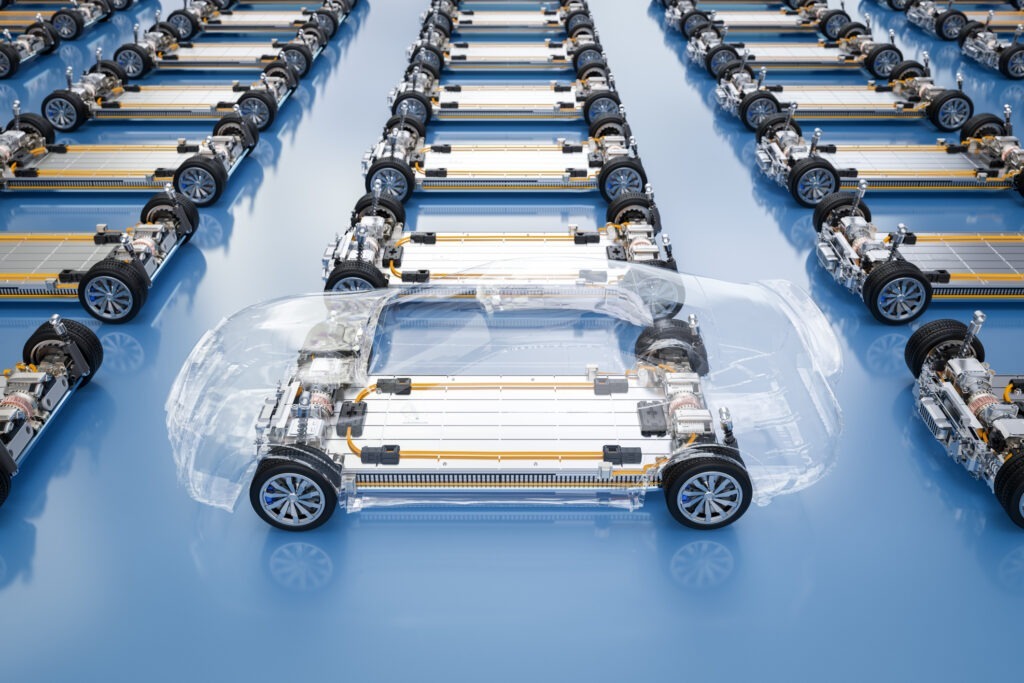The production of batteries for light electric vehicles (EVs), including cars, SUVs, light-commercial vehicles (LCVs) and pick-up trucks, continues to pick up pace.
Output of the power-storage unit grew 57% year-on-year in the third quarter of 2023. This outpaced the 39% increase in EV production, as revealed by new data provided by EV-volumes.com.
The global EV market has seen many new electric models introduced this year, with a sizeable number featuring bigger battery capacities. This puts manufacturers of the core electric component in a primary position as EV uptake continues.
CATL drops market share
CATL remained at the front of the battery-production pack in the first three quarters of 2023, holding on to a market share of 32.2%. The manufacturer supplied 158GWh worth of batteries for use in light EVs between January and September. This marked a 56.5% increase year on year.
In November, CATL announced it had signed an agreement to supply Stellantis with local lithium-iron-phosphate (LFP) battery cells and modules. With a potential joint venture also in the works, the battery manufacturer may look to strengthen its grip on the market through additional collaborative efforts.
‘With Stellantis’ time-honoured expertise in car manufacturing and CATL’s advanced battery technology, we believe the partnership will be a decisive step on both parties’ journey towards carbon neutrality goals,’ said Robin Zeng, chairman and general manager of CATL. ‘We will remain dedicated to delivering more competitive and sustainable solutions for our partners to promote global energy transition.’
Improved power-storage technology will also benefit the manufacturer. The new Qilin battery, which powers the Zeekr 001 and the upcoming ‘super-fast charging’ Shenxing unit, should help bolster CATL’s position at the top of the ranking.
LG holds on to second
At 81.9GWh, LG Energy Solution produced the second-largest volume of EV batteries in the first nine months of 2023 (16.7% share). This equated to a year-on-year increase of nearly 49% from some 55GWh produced across the same period in 2022.
LG Energy Solution recently signed a long-term battery supply agreement with Toyota to power its EVs in the US. This will result in 20GWh of nickel, cobalt, manganese and aluminium (NCMA) battery modules being delivered annually from 2025.
‘We are excited to have Toyota, the best-selling global automaker, as our new customer. With our 30 years of experience in lithium-ion batteries, we will provide innovative power solutions to support Toyota’s push further into battery electric vehicles,’ said Youngsoo Kwon, CEO of LG Energy Solution.
‘The agreement also presents another big opportunity for us to strengthen our production capacity in North America, thereby bringing more real-life, large-scale progress toward electrification in the region,’ Kwon added.
BYD boosted
LG Energy Solution’s second-place position did come under threat from BYD, which supplied 81.1GWh. The manufacturer’s output grew 81.2% in the first nine months of this year, equating to a market share of 16.5%. BYD can be expected to surpass LG Energy Solution in the last quarter of 2023.
Panasonic, once a leader in the automotive EV business, continued its slow slide down the rankings. Having produced 42GWh worth of battery capacity in the first three quarters of 2023, the company now sits in fourth with an 8.6% share.
With its main client, Tesla, now effectively a multi-supplier OEM when it comes to batteries, and no replacement client currently coming to fill the gap, the battery maker is losing ground. This is partially due to the small EV investments its compatriot automotive companies are making.
Power three
In the second half of the table, sixth-place Samsung SDI (5.1% share) was followed by a slowly growing CALB (3.2% share). However, the final three battery makers have all experienced significant growth. Between January and September, Farasis Energy in eighth, Envision AESC in ninth and Sunwoda in 10th saw production increase by 152.5%, 117% and 75.7% respectively.
Farasis had the success of GAC to thank alongside the addition of Mercedes-Benz as a client. Meanwhile, Envision AESC was able to rely on its relationship with Nissan, while also supporting Mercedes-Benz’ US operations. The number of EVs sold in this scenario is less significant than the large 108kWh battery used in the EQS. Lastly, Sunwoda benefitted as Leapmotor’s primary battery supplier.
The EV market continues to grow quickly, between 40% to 50% year on year. Alongside this, the average size of these power-storage units is also increasing. The battery market can therefore be expected to keep moving at an even


 Close
Close